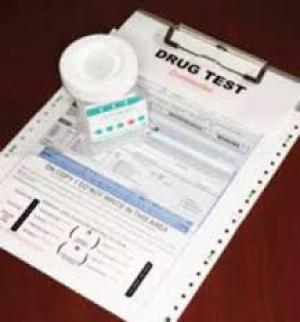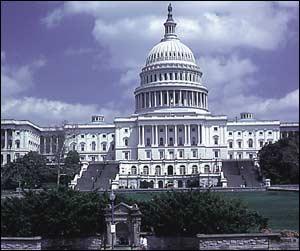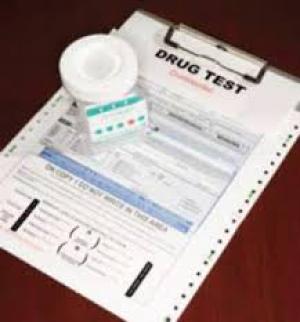Congressional Republicans are moving ahead with efforts to block the District of Columbia from implementing marijuana law reforms, but as of now, the situation is fluid. Activists are putting the pressure on Democrats to stand firm.
Once again, the federal courts have slapped down Florida Gov. Rick Scott's drug testing plans.
Your help is needed right now to stop bad language that would block DC's marijuana legalization moves in Congress's Continuing Resolution Omnibus Funding Bill.
House and Senate budget negotiators have agreed on a bill that includes cutting funding for federal medical marijuana enforcement in states where it is legal. And hemp, too.
Senate and House budget negotiators have agreed to language that would bar the District of Columbia from implementing marijuana legalization, but the battle ain't over yet.
Big news from DC on Tuesday as congressional budget negotiators included language barring the use of federal funds to go after medical marijuana where it is legal, and a whole lot of news from California, too.
An unarmed black man is dead after a white policeman shot him while attempting to make a drug bust. Crowds in Phoenix Thursday night wanted answers.
NYPD officers are involved in two out of three of our corrupt cop reports this week, and a pair of thieving San Francisco cops round out the rogues' gallery.
The GOP is yet to give up the ghost on blocking DC marijuana reforms, NYC Mayor de Blasio's new no-arrest pot possession policy is having an impact, Florida Gov. Rick Scott's pet welfare drug testing bill gets rejected by a federal appeals court, and more.
Global anti-drug bureaucrats are grumbling about marijuana legalization in America, one New York county decides to do asset forfeiture for misdemeanor drug offenses, Mississippi's food stamp drug testing program comes up snake-eyes, the SWAT boys fight to keep their military toys, and more.
DC's marijuana reforms remain under threat from congressional Republicans, Washington state's pot-sellers are feeling burdened by taxes, California doctors reject denying transplants to medical marijuana patients, the Justice Department issued racial profiling guidelines for federal law enforcement, more.
A Nevada legalization initiative is the first to qualify for the 2016 ballot, a new poll identifies an amorphous "marijuana middle," meth is on the rise in Iran, and so are poppies in the Golden Triangle, and more.
With the budget bill, Congress moves to block DC's voter-approved pot legalization, but also to block federal enforcement actions against medical marijuana where it is legal, a DC protest on the legalization move is set for this afternoon, and more.
[This article was written in partnership with Alternet, and was originally published here.]
Reflecting the will of the voters, the elected representatives of the people of Washington, DC -- the DC city council -- approved marijuana decriminalization earlier this year. District voters went even further than the council in last month's elections, approving an initiative to legalize the possession and cultivation of small amounts of pot with a whopping 70% of the vote.Now, congressional Republicans are working feverishly to block the District from putting the results of this exercise in democracy into effect. Rep. Andy Harris (R-MD) is leading a House effort to block federal funds being used for DC pot law reforms. Harris has crafted an amendment to the DC appropriations bill that would bar the use of federal or local funds to implement the reforms, and Rep. Harold Rodgers (R-KY), head of the House Appropriations Committee, has agreed to include Harris's amendment in the bill.
And, according to the Drug Policy Alliance (DPA), which has been deeply involved in DC marijuana reform efforts, "Democrats are rumored to be cutting a deal with Republicans" that would sacrifice legalization in order to save decriminalization."
[Update: Late Tuesday afternoon, DPA released the following report: "Currently, sources are reporting that Congress is considering allowing Initiative 71, approved by 70% of District residents, to stand while preventing future action on the District of Columbia's ability to tax and regulate marijuana. These reports stand in sharp contrast to a previously reported deal that would have stopped the ballot measure from taking effect."]
House Minority Leader Rep. Nancy Pelosi (D-CA) hasn't exactly quelled those rumors. At a press conference last Friday, she said she supported the District's autonomy, but stopped short of saying any Republican moves to block the implementation of decriminalization or legalization would be a "deal breaker" on agreement for a broader appropriations package. (Republicans are also seeking to use the appropriations bill to overturn DC firearms safety laws.)

The pressure is on House Minority Leader Nancy Pelosi (D-CA) (house.gov)
"I have expressed concerns about treating the District of Columbia in a fair way, respecting home rule," Pelosi said. "I'm not saying any one of them is a deal breaker, but I'm saying this is an array of concerns that we have: clean air, good food standards, workplace safety, fairness to the District of Columbia, how the top line dollar is allocated within the legislation."
That not-so-ringing endorsement of the District's ability to democratically determine its own drug policies, as well as the rumored deals, has prompted DPA and other reform supporters to ramp up the pressure on congressional Democrats. In an open letter to the Democratic leadership today, a number of civil rights and other advocacy groups, including DPA, DC Votes, and the DC branches of the ACLU, NAACP, and NOW, called on the Democrats to grow a backbone.
"As you conclude negotiations over the FY15 Financial Services and General Government appropriations bill, we urge you to reject all efforts to include undemocratic restrictions on DC's rights," said the letter addressed to Pelosi and Senate Majority Leader Harry Reid (D-NV). "As you know, the spending bill passed by the House included new provisions that would interfere in the District of Columbia's local affairs, including language intended to overturn the results of a local voter initiative. The undersigned organizations advocate on diverse issues, but are united in our opposition to the inclusion of social policy riders targeting the District of Columbia in the appropriations bill."

"Democratic leadership made it clear they would stand with voters on this crucial racial justice issue, and push back against Republican opposition to the DC law," said Michael Collins, policy manager at DPA's office of national affairs. "Democrats have always made claims of supporting DC home rule now is their chance to stand with 70% of voters in the District who voted for marijuana reform," Collins said.
Advocates are particularly dismayed given the racial disparities in the enforcement of marijuana laws in the District. According to a 2013 ACLU report, not only did DC have the highest per capita number of pot possession arrests -- more than three times the national average -- but it also saw black people arrested for pot possession at a rate more than eight times that of whites. In that regard, DC was second, trailing only the state of Iowa among the 50 states.
The Republican efforts to interfere -- and block these moves to reduce racial disparities in the District -- takes on added salience in the context of weeks of protests nationwide over racially biased policing.
"In light of recent events in Ferguson and New York, it is particularly disturbing that Congress would choose to overturn the will of the voters in a majority black city," said DPA policy manager and vice-chair of the DC Cannabis Campaign, which was responsible for the passage of Initiative 71, the legalization initiative. "DC voters chose to reform their marijuana laws, which have a direct impact on how communities of color interact with police. Congress is poised to undermine that."
But the Republican Party is no longer a monolith when it comes to marijuana law reform. On at least five votes this year, some Republican legislators voted in favor of such reforms. It is questionable whether the GOP could block DC's reforms on a straight up-and-down vote. By tying the effort to the broader appropriations bill, however, the issue is placed in the hands of the congressional leadership, and that could leave the District hanging out to dry. It's time for Nancy Pelosi and Harry Reid to stand up for the District and for democratic principals, the advocates say, and they are prodding them today.
back to top
[This article was written in partnership with Alternet, and was originally published here.]
Florida Governor Rick Scott's (R) drug testing crusade hit yet another roadblock Wednesday as a federal appeals court upheld a lower court's ruling that his plan to make welfare applicants submit to mandatory, suspicionless drug tests was unconstitutional.
As other Republican governors -- most notably
Scott Walker in Wisconsin and
Paul LePage in Maine -- did in this year's election campaign, Rick Scott made drug testing a key campaign promise in his 2010 election campaign. The following year, the Republican-dominated state legislature acceded to Scott's request and passed a welfare drug testing law.
Welfare applicants weren't the only target of Scott's drug testing push. He also sought to impose random, suspicionless drug testing on state employees through an executive order. But that was struck down by the federal courts as violating the Fourth Amendment's proscription against unreasonable searches and seizures. The US Supreme Court denied his appeal of that ruling in August.
And now, the second prong of Scott's drug testing thrust has been struck down. The decision came in Lebron v. Florida Department of Children and Families, in which Navy veteran, college student, and single father Luis Lebron filed for food stamp assistance, but was denied after he refused to undergo a drug test. Supported by the ACLU of Florida and the Florida Justice Institute, Lebron sued to have the law overturned.
Citing a lengthy history of federal court precedents, Lebron's legal team argued that like the random, suspicionless drug testing of state workers, the mandatory, suspicionless drug testing of welfare applicants violated the Constitution's protections against unreasonable searches and seizures. US District Court Judge Mary Scriven agreed, ruling in 2011 that the policy was unconstitutional.
The never-say-die Scott appealed that decision. The 11th Circuit Court of Appeals in Atlanta held a hearing on the case on November 20. It then took less than two weeks to reach its decision.
The bipartisan panel of federal judges ruled unanimously that the state of Florida had failed to provide any evidence that there was a strong government need to strip welfare applicants of constitutional protections.
"We have no reason to think impoverished individuals are necessarily and inherently prone to drug use, or, for that matter, are more prone to drug use than the general population," Judge Stanley Marcus wrote for the court. "The State has presented no evidence demonstrating that drug testing saves a significant portion of TANF funds that could otherwise be spent on drugs," he added, pointing to a 2000 state study that found welfare applicants were less likely to use drugs than the general population and noting that in the three months the drug testing program was in effect, only 2.76% of applicants tested positive.

Florida Gov. Rick Scott gets shot down again on drug testing (florida.gov)
"In the final analysis, the warrantless, suspicionless urinalysis drug testing of every Florida TANF applicant as a mandatory requirement for receiving Temporary Cash Assistance offends the Fourth Amendment. On this record, the State has not demonstrated a substantial special need to carry out the suspicionless search -- we see no concrete danger, only generalized public interests," Marcus wrote.
Marcus also noted that "citizens do not abandon all hope of privacy by applying for government assistance" and that "by virtue of poverty, TANF applicants are not stripped of their legitimate expectations of privacy." Having to urinate in a cup in front of another person "intrudes upon expectations of privacy that society has long recognized as reasonable," he added.
Nor were the judges buying the state's argument that welfare applicants effectively waived their constitutional rights by consenting to drug tests as a condition of receiving benefits or that the state had a "special need" to protect the children of drug-using welfare applicants.
"[T]he State cannot use consent of the kind exacted here -- where it is made a condition of receiving government benefits -- to wholly replace the special needs balancing analysis," the court held. "We respect the State's overarching and laudable desire to promote work, protect families, and conserve resources. But, above all else, we must enforce the Constitution and the limits it places on government. If we are to give meaning to the Fourth Amendment's prohibition on blanket government searches, we must -- and we do -- hold that [the welfare drug testing law] crosses the constitutional line."
While, given a solid line of federal court setbacks for the law, the 11th Circuit's decision was not exactly a surprise, advocates pronounced themselves well-pleased.
"The 11
th Circuit has affirmed that the 4th Amendment applies to everyone, even those applying for government assistance, said Florida Justice Institute executive director Randall Berg. "The same rationale for requiring suspicionless drug tests of TANF recipients could be used to require suspicionless searches for any kind of government benefit, whether it is social security, farm subsidies, or student scholarships. Today, the court has rejected that rationale, drawing a clear line that will keep us from going down that slippery slope."
"We are very pleased by the Court's opinion, which once again makes clear that the US Constitution forbids the State of Florida from subjecting ordinary private citizens to invasive and unwarranted searches," said ACLU of Florida associate legal director Maria Kayanan.
"This is a resounding affirmation of the values that the Fourth Amendment of the U.S. Constitution protects -- that none of us can be forced to submit to invasive and humiliating searches at the whim of the government, and that the Constitution protects the poor and the wealthy alike," she continued. "The Court has once again confirmed what we argued all along: that the state of Florida cannot treat an entire class of people like suspected criminals simply because they've asked the State for temporary assistance."
While the federal courts have been clear that, with limited exceptions, mandatory, suspicionless drug testing violates the Constitution, Republican governors and legislators in other states have responded by passing public benefits drug testing laws that can pass constitutional muster by first establishing some sort of "reasonable suspicion" before requiring drug testing. According to the National Council of State Legislatures, at least 11 states have done so.
The results have not been particularly impressive. In Kansas, only 20 people have been tested in the first four months the law has been in effect; four failed the drug test. Next door in Missouri, the state is spending $336,000 a year on its welfare drug testing. It has tested 655 people; 69 failed the drug test. But 711 others refused to take it. In Utah, a year after it passed a 2012 welfare drug testing law, the state had spent $30,000 to drug test applicants, but only came up with 12 who tested positive. In Tennessee, where a similar law went into effect this year, the state has tested 800 applicants, with only one person testing positive.
But whether public benefits drug testing programs actually either save states money by reducing welfare rolls or help families by encouraging recipients to go straight is probably not as important to politicians as the political calculus behind them. With its coded appeal to racial and class hostilities wrapped in a guise of caring and fiscal responsibility, it's a red meat issue for the Republican base.
back to top
Last month, 70% of voters in Washington, DC approved an initiative to legalization possession and home growing of marijuana. Later in the month, a committee of DC's city council advanced "tax and regulate" legislation that would authorize store sales too. Unfortunately, drug warriors in Congress led by Rep. Andy Harris (R-MD) got language included in the pending "Continuing Resolution" omnibus bill to fund the government that would block tax and regulate legislation in the District, and which might block the initiative too. The rumor is that some (not all) Republicans wanted to stop DC from moving ahead, and that Democrats cut a deal.
There is only a little time left to influence this process. Please call your US Representative and your two US Senators and ask them to block the Harris Amendment to the omnibus spending bill that would block marijuana legalization in the Districut of Columbia. You can reach your legislators (or find out who they are) through the Congressional Switchboard at (202) 224-3121, You can also look up that information on our web site's Congressional lookup tool here. When you're done, please send us a note to let us know what they said. (If you'd like a little help with what you're going to say on the phone, you can find a sample script from our friends at the "Just Say Now" campaign here.)
If you're in DC, there's a protest you can join today (Wednesday 12/10) -- a march from the Dept. of Justice at 950 Pennsylvania Ave. NW, to the US Capitol, meeting at 5:00 with the march starting at 6:00pm.
Thank you for taking action -- time, and the truth are on our side!
back to top
In a deal hammered out Tuesday evening, the leaders of the House and Senate appropriations committees agreed on a budget bill that includes a measure curbing Justice Department enforcement efforts in states where medical marijuana is legal. The measure, in the form of an amendment offered by Rep. Dana Rohrabacher (R-CA), passed the House back in May.

No more DEA medical marijuana raids? (justice.gov)
The hemp industry hasn't responded yet, but medical marijuana supporters are pleased.
"This is great news for medical marijuana patients all across the country," said Rep. Sam Farr (D-CA), one of the co-authors of the House measure. "This amendment protects patients while the federal government catches up with the views of the American people. Patients will have access to the care legal in their state without fear of federal prosecution. And our federal dollars will be spent more wisely on fighting actual crimes and not wasted going after patients."
The relevant section of the bill, Section 538, lists all the states that have some form of legalized medical marijuana and says, "None of the funds made available in this Act to the Department of Justice may be used… to prevent such States from implementing their own State laws that authorize the use, distribution, possession, or cultivation of medical marijuana."
"We applaud this Congress for doing the right thing by protecting the rights of patients, and ending a years-long attack on the medical marijuana community," said Mike Liszewski, government affairs director for Americans for Safe Access (ASA), the medical marijuana advocacy group that has been championing the measure for years. "By approving this measure, Congress is siding with the vast majority of Americans who are calling for a change in how we enforce our federal marijuana laws."
"Congressional leaders seem to have finally gotten the message that a supermajority of Americans wants states to be able to implement sensible marijuana reforms without federal interference," said Tom Angell, executive director of Marijuana Majority. "This legislation greatly reduces the chances that costly and senseless DEA raids will come between seriously ill patients and the doctor-recommended medicine they need for relief."
If the omnibus budget bill is approved, the spending curb could well halt several pending federal criminal cases, including the case of the Kettle Falls Five, who are being prosecuted in Washington, a state where not only medical but recreational marijuana is legal, for growing medical marijuana within state guidelines. It would also severely cramp the style of the DEA, which has conducted hundreds of over-the-top aggressive raids in medical marijuana states. And it could mark an end to numerous civil asset forfeiture cases brought by US Attorneys in California against dispensaries in Berkeley, Oakland, San Francisco, and Orange County.
"We now have a solid foundation from which to establish a more comprehensive public health policy at the federal level," said ASA's Liszewski. "We're excited to be able to work with a Congress that is more in line with the will of the people, and more determined to roll up its sleeves and get things done on the issue of medical marijuana."
Before it becomes law, the budget bill must now be approved by the full House and Senate and then signed into law by President Obama. Those congressional votes are expected later this week, and there is little likelihood the bill will be defeated or that President Obama would seek to veto it.
back to top
The leaders of the House and Senate appropriations committees agreed on a budget bill Tuesday night that includes language seeking to block the District of Columbia from implementing the Measure 71 legalization initiative overwhelmingly approved by District voters. But there may be some wiggle room.
A bill summary provided by the House Appropriations Committee says the bill, which will be considered by the House and Senate later this week, "prohibits both federal and local funds from being used to implement a referendum legalizing recreational marijuana use in the District."The bill summary doesn't mention decriminalization, which was approved earlier this year by the DC city council and has already gone into effect.
Rumors had swirled throughout that day about what was being hammered out, with hopes raised at various points that some less onerous deal might be reached, perhaps one that would bar the DC city council from passing and implementing marijuana taxation and regulation. Such a DC bill is already in the works.
While reform advocates were disappointed with outcome, some are suggesting that the bill's language can be parsed in such a way to render the congressional ban moot. That remains to be seen.
This is not the first time Congress has acted to block the will of District voters on marijuana reform issues. In 1998, DC voters approved medical marijuana with 69% of the vote, but Congress blocked it for more than a decade. Now, DC voters, who approved legalization with 70% of the vote, are once again being given the back of the hand by the folks on Capitol Hill.
The omnibus budget bill is almost certain to pass Congress this week and be signed into law by President Obama. Then the legal battle to recognize the will of the people in Washington, DC, will commence.
back to top
Big news from DC on Tuesday as congressional budget negotiators included language barring the use of federal funds to go after medical marijuana where it is legal, and a whole lot of news from California, too. Let's get to it:
NationalOn Tuesday, a congressional budget deal blocked federal interference in medical marijuana states. In a deal hammered out Tuesday evening, the leaders of the House and Senate appropriations committees agreed on a budget bill that includes a measure curbing Justice Department enforcement efforts in states where medical marijuana is legal. The measure, in the form of an amendment offered by Rep. Dana Rohrabacher (R-CA), passed the House back in May. The relevant section of the bill, Section 538, lists all the states that have some form of legalized medical marijuana and says, "None of the funds made available in this Act to the Department of Justice may be used… to prevent such States from implementing their own State laws that authorize the use, distribution, possession, or cultivation of medical marijuana"
California
Last Tuesday, El Dorado County supervisors voted not to repeal the county's cultivation ordinance. Instead, supervisors decided to appoint a task force consisting of county counsel, the sheriff, DA and activists to come up with a solution that will protect patients' rights.
Also last Tuesday, Kern County supervisors approved civil lawsuits against collectives and cooperatives. The supervisors are going after 19 co-ops or collectives located in unincorporated areas of the county. The county previously sued other collectives and most of those have closed up shop.
Last Thursday, legislators filed statewide medical marijuana regulation bills. Legislators will try again next year to bring statewide regulation to the state's medical marijuana industry. Assemblymember Reggie Jones-Sawyer (D-Los Angeles) has filed Assembly Bill 26, which largely revives Tom Ammiano's failed AB 1894 from this year, while Rep. Rob Bonta (D-Oakland) has filed Assembly Bill 34, which is a one-sentence placeholder bill saying it is intended to regulate medical marijuana.
Last Saturday, California doctors rejected denying organ transplants to medical marijuana patients. The California Medical Association (CMA) voted unanimously this past weekend to urge transplant clinics in the state against removing patients from organ transplant lists based on their medical marijuana status or use. The CMA House of Delegates was in San Diego for its annual meeting, and voted Saturday on Resolution 116-14 in support of patients' ability to remain on transplant lists despite their medical marijuana use.
On Monday, the Siskiyou County planning division released its draft cultivation ordinance. The ordinance would limit outdoor grows to four plants on properties an acre or smaller, six plants on properties up to 2.5 acres, eight plants on up to five acres, and 10 plants on properties greater than five acres. Comments can be submitted via email at [email protected].
On Tuesday, Butte County supervisors approved spending $446,500 to enforce the county's cultivation ordinance. The ordinance limits the size of medical marijuana gardens to 50 square feet on property larger than a half-acre, 100 square feet on properties larger than five acres, and 150 square feet on properties larger than 10 acres. The ordinance also allows anonymous denunciations of alleged violations.
[For extensive information about the medical marijuana debate, presented in a neutral format, visit MedicalMarijuana.ProCon.org.]
back to top
A Phoenix police officer shot and killed an unarmed black man while responding to reports of a drug deal taking place Tuesday night. Rumain Brisbon, 34, becomes the 37th person to die in US domestic drug law enforcement operations so far this year.
Unlike most drug war deaths, and undoubtedly because of the context of police officers escaping criminal charges in the deaths of unarmed black men Michael Brown and Eric Garner, this one led to angry protests.An estimated 200 people rallied Thursday night in Phoenix to protest the killing. At press time, they were planning on marching to police headquarters to demand answers, including the name of the officer who shot and killed Brisbon.
According to KPHO TV News, citing police accounts, the unnamed Phoenix police officer had been on a burglary investigation when he learned that the driver of an SUV was allegedly selling drugs at a nearby 7-Eleven. After obtaining a description of the suspect and the license number of the vehicle, they officer get the address of the vehicle's owner and went to the apartment complex listed.
When he got to the apartment complex, someone told him the occupants of the SUV were selling drugs. When he approached the vehicle, the driver, later identified as Brisbon, got out, opened a rear door, and reached into the back seat. As Brisbon then closed the door, the officer ordered him to show his hands, but Brisbon instead placed one or both of them near his waistband.
The officer then drew his weapon. Brisbon fled into a corridor, where the officer caught up with him, and a struggle ensued. Brisbon put his left hand into his pocket, and the officer grabbed his hand, while telling him to keep his hand in his pocket. The officer wrote in his report that he believed he felt the handle of a gun while holding Brisbon's hand in his pocket.
The officer was not able to maintain his hold on Brisbon's hand and, fearing he had a gun, fired twice, striking Brisbon in the chest. He was pronounced dead at the scene.
Police didn't find a gun in Brisbon's pocket. Instead, they found a bottle of oxycodone tablets. Police did find a gun in the vehicle, along with a jar containing marijuana.
The officer was not injured.
Brisbon's criminal record included a DUI, two aggravated DUIs, driving with a suspended license, and two separate counts of "marijuana use and possession and failure to pay a fine."
back to top
NYPD officers are involved in two out of three of our corrupt cop reports this week, and a pair of thieving San Francisco cops round out the rogues' gallery. Let's get to it:
In Sunrise City, Florida, an NYPD officer was arrested last Tuesday while trying to buy 10 pounds of cocaine. Officer Philip LeRoy, a former Queens precinct "Cop of the Year," now faces charges of felony weapon possession, cocaine trafficking, and conspiracy to traffic cocaine. Sunrise is notorious for its asset forfeiture-driven drug stings. At last report, Le Roy was still in jail awaiting extradition.In New York City, an NYPD officer was arrested last Friday for driving a drug dealer around, warning a cocaine dealer that police action was coming, and offering to arrange a heroin deal. Officer Merlin Alston allegedly told one cocaine supplier to "ghost" and "be gone" from a corner when police were coming, helped another dealer deliver cocaine, and offered to help the latter deal score some heroin. He is charged with official misconduct and conspiracy.
In San Francisco, two San Francisco police officers were convicted last Friday of stealing thousands of dollars worth of cash and other property from suspected drug dealers. Officer Edmond Robles and Sgt. Ian Furminger were found guilty by a federal jury of five and four counts respectively. There could be more guilty verdicts or plea bargains to come in this scandal, which began Public Defender Jeff Adachi released surveillance videos showing officers walking out of cheap SRO hotels with bags of residents' possessions.
back to top
The GOP is yet to give up the ghost on blocking DC marijuana reforms, NYC Mayor de Blasio's new no-arrest pot possession policy is having an impact, Florida Gov. Rick Scott's pet welfare drug testing bill gets rejected by a federal appeals court, and more. Let's get to it:
Marijuana PolicyRepublican Effort to Block DC Decriminalization, Legalization Still Lives. Key Republican House and Senate members are set to decide whether to accept a policy rider from Rep. Andy Harris (R-MD) that would block federal funds from being used to legalize or reduce penalties for pot, Roll Call reports. The rider is the form of an amendment to the DC appropriations bill. "It seems like the marijuana issue has been kicked up to the 'big four.' So that'll get settled," Rep. Ander Crenshaw (R-FL) said Tuesday, referring to the chairmen and ranking members of the House and Senate Appropriations committees who are negotiating the spending package. Harris's amendment passed the House in June, but was not included in the Senate version of the bill.
Alaska Could Generate $7 Million in Pot Tax Revenues in First Year, Report Finds. A Legislative Research Service report commissioned by Alaska lawmakers estimates that the state could take in $7 million in marijuana taxes in its first year. But the report also noted that the cost of implementing rules and regulations to govern the newly legal industry could be about as much.
Georgia Lawmaker Files Legalization Initiative Bill. Sen. Curt Thompson (D-DeKalb County) has pre-filed Senate Resolution 6, which would, if passed, put a constitutional amendment legalizing marijuana before the voters. "I anticipate us having a discussion this session. I don't know where it will lead, but if you don't ask you don't get," Thompson said.
New York City Mayor Says Pot Arrests Down Dramatically With New Policy. In the first two weeks of a new policy directing the NYPD to merely ticket -- not arrest -- people for small-time marijuana possession, pot arrests have dropped more than 60%, Mayor Bill de Blasio said Wednesday.
Wyoming Not There Yet on Legalization. A University of Wyoming poll found that only 35% approved of the personal use of marijuana by adults, with 60% opposed. But, hey, that's up 12 points from a similar question asked by the same pollsters in 2000. Cowboy State residents, however, do come down in favor of medical marijuana, with 72% approving. That number is unchanged from the 2000 poll.
Medical Marijuana
California Medical Marijuana Regulation Bills Filed. Legislators will try again next year to bring statewide regulation to the state's medical marijuana industry. Assemblymember Reggie Jones-Sawyer (D-Los Angeles) has filed Assembly Bill 26, which largely revives Tom Ammiano's failed AB 1894 from this year, while Rep. Rob Bonta (D-Oakland) has filed Assembly Bill 34, which is a one-sentence placeholder bill saying it is intended to regulate medical marijuana.
Drug Testing
DC Council Passes Bill to Ban Pre-Employment Marijuana Testing. The council Tuesday approved a bill that will bar employers from drug testing potential new hires before a job offer is made. The bill is B20-0728, the "Prohibition of Pre-Employment Marijuana Testing Emergency Act of 2014." While the bill bars pre-employment testing for marijuana, it does allow for on-the-job testing for marijuana, noting that employees "must still adhere to the workplace policies set forth by their employer."
Federal Appeals Court Blocks Florida Welfare Drug Testing Law. The 11th US Circuit Court of Appeals in Atlanta has upheld a lower court ruling that Gov. Rick Scott's pet welfare drug testing law is unconstitutional. The ruling came in Lebron v. Florida Department of Children and Families and is in line with other federal precedent on the issue. The federal courts have held that, with few exceptions, suspicionless drug testing is a violation of the Fourth Amendment's protection against unlawful searches and seizures.
Michigan House Approves Suspicion-Based Welfare Drug Testing Bill. The House voted Wednesday to approve Senate Bill 275, which would create a pilot program mandating suspicion-based drug testing of welfare recipients. The measure has already passed the Senate, but now awaits a concurrence vote after the bill was amended in the House. One of those amendments stripped a provision from the bill that would have allowed the Department of Human Services to provide cash assistance to "an appropriate protective payee" for children if their parents lose benefits because of failing the drug test.
New Synthetic Drugs
Another Bill to Ban New Synthetic Drugs Filed in Texas. Sen. Charles Perry (R-Lubbock) Wednesday filed Senate Bill 199, which would add specified newly discovered synthetic drugs to the Texas Controlled Substances Act and create a provision designed to ban analogues as well. Two other bills aimed at new synthetics have already been filed for next year's session.
back to top
Global anti-drug bureaucrats are grumbling about marijuana legalization in America, one New York county decides to do asset forfeiture for misdemeanor drug offenses, Mississippi's food stamp drug testing program comes up snake-eyes, the SWAT boys fight to keep their military toys, and more. Let's get to it:
Marijuana PolicyMissouri Legalization Initiative Petition Open for Public Comment. A legalization initiative petition sponsored by Show-Me Cannabis has been submitted to the secretary of state's office, and Missouri residents now have 30 days to comment on the initiative petition. They can do so here (it's Petition 2016-009). This is essentially the same petition submitted a month ago, but has been resubmitted with grammatical fixes.
INCB Head Complains About Legalization in US States. Lochan Naidoo, president of the International Narcotics Control Board (INCB) is concerned about the implications of marijuana legalization in US states. "Legalization for recreational use is definitely not the right way to go," he told Reuters in an interview. "We do know about the damage that cannabis does to the brain," the South African physician said. "I'm not sure how well people are going to be able to protect their children." Naidoo added that the 1961 Single Convention on Narcotic Drugs requires countries to comply with its provisions banning marijuana, and the US should do so in "all its territories."
Asset Forfeiture
New York County Approves Asset Forfeiture for Misdemeanor Drug Cases. Legislators in Orange County Thursday approved a law that allows authorities to seize cash and cars from defendants in misdemeanor drug cases, but only after they have been convicted. The measure passed on a party-line vote with Republicans voting for it and Democrats against despite fierce opposition from sitting Democrats and audience members. DA David Hoovler has portrayed the measure as means of keeping seized assets in the county instead of sending the money to the general fund in Albany, as required under the state's asset forfeiture law.
Drug Testing
Mississippi Welfare Drug Testing Program Has Only Two People Testing Positive. The state law that went into effect in August has so far resulted in 3,656 Temporary Assistance for Needy Families (TANF, the food stamp program) applicants being screened for drug use, 38 being selected for drug testing, and a grand total of two testing positive for drugs. It's not clear how much the state has spent implementing the program, but Cassandra Welchin, policy director of the Mississippi Low Income Child Care Initiative, said the result was clear. "It's just a waste of money," she said. "Poor working families don't need a barrier to services and this is just another barrier."
Law Enforcement
SWAT Lobby Fights Back Against Policing Reforms in Wake of Ferguson. The National Tactical Officers Association (NTOA), which represents more than 1,500 SWAT teams across the country, has mobilized to protect the federal program that provided military surplus equipment to local law enforcement. NTOA sent emails to all 535 members of Congress urging them not to end or tighten up the Pentagon's 1033 program, which transfers equipment including armored vehicles, grenade launchers, and bayonets to local departments. NTOA executive director Mark Lomax has also been busy, reaching out to congressional offices and testifying before both the House and Senate Homeland Security committees. And it looks like it worked -- Congress will take no action on the program as this year's session winds down. Click on the link for much more.
back to top
DC's marijuana reforms remain under threat from congressional Republicans, Washington state's pot-sellers are feeling burdened by taxes, California doctors reject denying transplants to medical marijuana patients, the Justice Department issued racial profiling guidelines for federal law enforcement, and more. Let's get to it:

House Minority Leader Nancy Pelosi (house.gov)
Nancy Pelosi Pledges Support for DC Autonomy as Possible Battle Over Marijuana Reforms Looms. At a press conference last Friday, House Minority Leader Nancy Pelosi said she supported the District's autonomy, but stopped short of saying any Republican moves to block the implementation of decriminalization or legalization would be a "deal breaker" on agreement for a broader appropriations package. "I have expressed concerns about treating the District of Columbia in a fair way, respecting home rule," Pelosi said. "I'm not saying any one of them is a deal breaker, but I'm saying this is an array of concerns that we have: clean air, good food standards, workplace safety, fairness to the District of Columbia, how the top line dollar is allocated within the legislation." Rep. Andy Harris (R-MD) is leading a House effort to block federal funds being used for pot law reforms, and the Rep. Harold Rodgers (R-KY), head of the House Appropriations Committee wants to see Harris's amendment included in the appropriations bill. Stay tuned.
Tax Issues Fueling Concerns Among Washington State Pot Retailers. The state's 25% excise tax and the federal government's refusal to let pot businesses to deduct legitimate business expenses -- such as state taxes -- is putting the squeeze on the state's fledgling retail industry. That's helping to contribute to retail marijuana prices that are higher than black market prices, but still not enough to be profitable under the weight of the state and federal taxes. There could be a fix coming in the state legislature; efforts are also underway to change the federal tax code to recognize legal pot businesses.
Medical Marijuana
California Doctors Reject Denying Organ Transplants to Medical Marijuana Patients. The California Medical Association (CMA) voted unanimously this past weekend to urge transplant clinics in the state against removing patients from organ transplant lists based on their medical marijuana status or use. The CMA House of Delegates was in San Diego for its annual meeting, and voted Saturday on Resolution 116-14 in support of patients' ability to remain on transplant lists despite their medical marijuana use. "I am very proud of my colleagues at the CMA, who once again endorsed the principle that medical decision for the benefit of patients be based on science and not moralistic prejudices," said Dr. Larry Bedard, a retired Marin General Hospital emergency physician and 30-year CMA delegate who currently serves on its Marijuana Technical Advisory Committee.
Law Enforcement
Justice Department Unveils Racial Profiling Ban for Federal Law Enforcers. The Justice Department today issued guidelines that will ban federal law enforcement agents from profiling on the basis of race, religion, national origin, and other characteristics. The guidelines cover federal agencies within the Justice Department, including the FBI, the DEA, and the Bureau of Alcohol, Tobacco, Firearms and Explosives. They also extend to local and state officers serving on joint task forces alongside federal agents. The new guidelines will not apply to security screeners in airports and at border checkpoints, nor are they binding on state and local police forces.
International
Budapest Mayor Wants Mandatory Drug Tests for Teenagers, More. Mayor Mate Kocsis wants mandatory annual drug testing for city teenagers, as well as for elected officials and journalists. He said the idea was to target "those most at risk, decision-makers and opinion-formers." Kocsis is a member of the governing Fidesz Party, whose parliamentary group will discuss his proposal today. In August, Kocsis managed to get a needle exchange program for injection drug users shut down. He has also introduced legislation to ban picking through garbage and sleeping on the streets.
back to top
A Nevada legalization initiative is the first to qualify for the 2016 ballot, a new poll identifies an amorphous "marijuana middle," meth is on the rise in Iran, and so are poppies in the Golden Triangle, and more. Let's get to it:

In Burmese fields the poppies grow... (unodc.org)
"Marijuana Middle" Identified in Third Way Poll. A new national poll from the centrist think-tank Third Way finds Americans almost even split on legalization (50% yes, 47% no), but with a broad and deep "marijuana middle" that may not support legalization in its own state, but does support federal action to allow states that have legalized it a "safe haven." Two-thirds said Congress should pass a "safe haven" law, while 60% said legalization should be up to the states, not the federal government. The poll also examined the demographics of the "marijuana middle." Click on the link for all the details.
JAMA on the Impact of Marijuana Legalization. The Journal of the American Medical Association (JAMA) Monday published "The Implications of Marijuana Legalization in Colorado." (Click the title link to read the article.) The authors found an increase in reports of emergency room visits for marijuana intoxication, as well as problems related to the production of new marijuana products, ranging from burns caused by exploding hash-oil labs to problems associated with the overindulgence in edibles. But the authors also found that legalization was increasing access to marijuana for medical reasons, including pain control, where it is much safer than opiates.
Anchorage Assembly to Hold Hearing on Banning Pot Businesses. At the behest of Assembly member Amy Demboski, the Anchorage Assembly will hold a hearing on her proposal to ban licensed pot businesses in the city one week from today. Supporters of legalization are looking for people to show up. Click on the link for more information.
Illinois Appeals Court Rules Worker's Admission of Off-Duty Marijuana Use Not Sufficient to Deny Unemployment Benefits. A worker who was fired from his job after admitting smoking marijuana when confronted with a random drug test (which he passed) cannot be denied unemployment benefits, the state's 5th District appellate court has ruled. The case is Eastham v. The Housing Authority of Jefferson County.
It's Official -- Nevada Initiative Qualifies for 2016 Ballot. Nevada is first out of the blocks to legalize marijuana via an initiative in 2016. Secretary of State Ross Miller Monday certified that the initiative had qualified for the ballot. Now, voters will have the opportunity to legalize it in the 2016 elections -- unless the state legislature acts first to approve the measure.
Prescription Opiates
Doctors Are Cutting Back on Prescriptions for Pain Relievers. In a study published in the Journal of the American Medical Association (JAMA), researchers report that half of primary care physicians are reducing their prescribing of opiate pain relievers compared to last year and that 85% of doctors believe they are overprescribed. The doctors reported concerns about addiction, overdoses, and traffic accidents. But an even greater number -- 90% -- were confident in their own ability to correctly prescribe opiates.
International
Meth in Iran. Reuters has a report on the increase of methamphetamine use in the Islamic Republic. The news agency notes that meth seizures more than doubled between 2008 and 2012 and that last year alone, the government seized 3.6 tons of speed. The report cites experts as saying the rise of meth is being driven by increased development in the country and a more complicated and faster-paced lifestyle.
Opium Production Thriving in the Golden Triangle, UN Reports. Opium production in Southeast Asia's Golden Triangle has increased for the eighth straight year, the UN said Sunday in its Southeast Asia Opium Survey 2014. The acreage under cultivation increased slightly, giving the region to ability to produce about 76 tons of heroin. Myanmar accounts for most of the Golden Triangle production, and the Shan State accounts for most of Myanmar's production. The Golden Triangle is the world's second largest opium production region, behind Afghanistan, but only produces about one-fifth the amount Afghanistan does.
back to top
With the budget bill, Congress moves to block DC's voter-approved pot legalization, but also to block federal enforcement actions against medical marijuana where it is legal, a DC protest on the legalization move is set for this afternoon, and more. Let's get to it:
Marijuana PolicyCongressional Budget Deal Seeks to Block DC Legalization. The leaders of the House and Senate appropriations committees agreed on a budget bill Tuesday night that includes language seeking to block the District of Columbia from implementing the Measure 71 legalization initiative overwhelmingly approved by District voters. A bill summary provided by the House Appropriations Committee says the bill, which will be considered by the House and Senate later this week, "prohibits both federal and local funds from being used to implement a referendum legalizing recreational marijuana use in the District." While reform advocates were disappointed with outcome, some are suggesting that the bill's language can be parsed in such a way to render the congressional ban moot. That remains to be seen.
DC Protest Against Congressional Interference Set For Tonight. The DC Cannabis Campaign, sponsors of the DC legalization initiative, has announced a march on the US Capitol tonight to protest Congress's move to override the voters' decision to legalize marijuana in the District. Marchers will gather at the Justice Department at 9th and Pennsylvania NW at 5:00pm, then march to the Capitol at 6:00pm.
Anti-Marijuana Speakers Heckled at DC Heritage Foundation Event. Rep. Andy Harris (R-MD), author of the budget bill amendment attempting to block legalization in DC, along with Rep. John Fleming (R-LA), another strong opponent of letting the District set its own marijuana laws, were greeted by hecklers at a Heritage Foundation event Tuesday. "I don't want to listen to these lies," shouted one heckler as Harris took the podium. "The people voted," a second shouted. Harris laughed when asked about the heckler, then proceeded to claim that legalizing marijuana would lead to increased teen drug use -- a claim that has not been borne out so far in states that have legalized it.
Medical Marijuana
Congressional Budget Deal Blocks Federal Interference in Medical Marijuana States. In a deal hammered out Tuesday evening, the leaders of the House and Senate appropriations committees agreed on a budget bill that includes a measure curbing Justice Department enforcement efforts in states where medical marijuana is legal. The measure, in the form of an amendment offered by Rep. Dana Rohrabacher (R-CA), passed the House back in May. The relevant section of the bill, Section 538, lists all the states that have some form of legalized medical marijuana and says, "None of the funds made available in this Act to the Department of Justice may be used… to prevent such States from implementing their own State laws that authorize the use, distribution, possession, or cultivation of medical marijuana." The bill also includes similar language barring the use of Justice Department funds to interfere with hemp research authorized under the already approved Agricultural Act of 2014.
Drug Testing
Florida Governor's Drug Testing Crusade Costing State's Taxpayers. The state has racked up at least $307,000 in legal fees and court costs as it tried in vain to defend Gov. Rick Scott's (R) unconstitutional law mandating suspicionless drug testing of welfare applicants. And taxpayers are likely to shell out even more -- in legal fees to the ACLU of Florida, which took the state to federal court over the law. The bill could rise even higher if Scott decides to appeal the four federal court decisions that have found the law unconstitutional.
International
Isle of Jersey Rejects Islander's Requests to Use Medical Marijuana. Jersey's drug law allows the health minister to issue license for possess marijuana for "special purposes," but the island's parliament has voted against allowing three residents to use medical marijuana products. "It is unlikely that 'special purpose' was ever intended to cover medicinal use," said one senator. "While the law allows for the minister for health and social services to issue a licence for research and special purposes it does not provide for the minister to step into the shoes of a doctor and, in effect, take clinical decisions in respect of an individual case."
Indonesian President to Ban Clemency for Drug Offenders Facing Execution. President Joko Widodo said Tuesday that he plans to enforce the death penalty for people convicted of drug crimes. There are currently 64 drug offenders on death row, and he said he would reject clemency requests for them. "They are not on my table yet. But I guarantee that there will be no clemency for convicts who committed narcotics-related crimes," Jokowi said. The government's insistence on implementing the death penalty has drawn criticism from human rights defenders in the country.
India Cops Do "Workarounds" to Bust Mephedrone Sellers. The synthetic psychedelic stimulant drug mephedrone is not illegal under the Narcotic Drugs and Psychotropic Substances Act, and police are resorting to workarounds to "curb the menace." Mumbai police have instructed officers to arrest sellers under the penal code's offense of selling poison. And some police have even arrested sellers by charging them with selling methamphetamine, which mephedrone is not.
back to top














